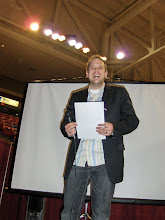Urban Dictionary defines an Asshat as "one who is oblivious to the world around them, lacking common sense". That's what I felt like when I showed up two weeks ago and didn't have a presentation ready. I wrote down the wrong date in my binder, never bothering to double check it against the syllabus.
I did, however, learn how an effective teacher can improvise a "plan b" when something doesn't go as planned. Esther didn't miss a beat and she gathered all the students together for a roundtable discussion on how to get students excited about reading, and what sorts of troubles and issues they can and will run into while learning to read. The discussion was lively and educational as well, and I'm glad I got to hear what everybody had to say about reading.
Monday, March 30, 2009
Readings for the last week of March
I love writing. I don't often think that I'm an amazing writer, but I do often feel as though I'm a proficient writer at the very least. Because of this, I was especially interested in this week's subject of writing.
In the P&B book, there are several different techniques which can be used with beginning to intermediate writers to teach the writing process and the organization of thoughts. Being the amazingly ADHD person that I am, I really enjoyed how the different techniques were presented. It was almost like a list, and very easy to follow.
I remember back in middle school and using the idea of clustering to come up with ideas. Maybe I could use this in my presentation tonight? Even though I had used clustering, I had never heard of mapping being used the way it is in this book. I REALLY like the idea of having a prompt in the middle, and then clustering the ideas around it. Even thought I'm a kinesthetic learner, it always helps to see the ideas on paper before me. It helps keep me focused, and the mapping and clustering techniques are chaotic enough to appeal to my nature, and they're organized enough to keep me focused on the task at hand and help me come up with better, more coherent writings.
In the P&B book, there are several different techniques which can be used with beginning to intermediate writers to teach the writing process and the organization of thoughts. Being the amazingly ADHD person that I am, I really enjoyed how the different techniques were presented. It was almost like a list, and very easy to follow.
I remember back in middle school and using the idea of clustering to come up with ideas. Maybe I could use this in my presentation tonight? Even though I had used clustering, I had never heard of mapping being used the way it is in this book. I REALLY like the idea of having a prompt in the middle, and then clustering the ideas around it. Even thought I'm a kinesthetic learner, it always helps to see the ideas on paper before me. It helps keep me focused, and the mapping and clustering techniques are chaotic enough to appeal to my nature, and they're organized enough to keep me focused on the task at hand and help me come up with better, more coherent writings.
Monday, March 23, 2009
Readings for March 23rd
I've never been able to read as fluently in my L2 as I can in English, and I've always been very envious of those who can. It was always a little bit of a sore-spot seeing my fellow students read and understand fluidly while I struggled to keep up.
Like Thea, I have trouble stopping and deciphering every word. I read in an ESL textbook that it's best to reread as many times as it takes to get the "gist" of the meaning instead of deciphering every word. It's IMPOSSIBLE to keep up with that much input and still figure out what you're reading about.
Like Thea, I have trouble stopping and deciphering every word. I read in an ESL textbook that it's best to reread as many times as it takes to get the "gist" of the meaning instead of deciphering every word. It's IMPOSSIBLE to keep up with that much input and still figure out what you're reading about.
Monday, March 16, 2009
Last week
Class was interesting tonight. I really liked how Mariya led a half-hour discussion with two questions, something which I could not accomplish. I suppose if I had to, I could fudge it, but I need more than that to take a half hour. I don't have the focus. :-)
I don't know if I would want to correct students as they made errors, because I think the hardest thing would be staying consistent. I think I would give up after a while, but it would make students rely on me too much, and if I stopped correcting them, they would have a very hard time discerning whether or not they had stopped making mistakes, or if I had merely stopped correcting them.
I don't know if I would want to correct students as they made errors, because I think the hardest thing would be staying consistent. I think I would give up after a while, but it would make students rely on me too much, and if I stopped correcting them, they would have a very hard time discerning whether or not they had stopped making mistakes, or if I had merely stopped correcting them.
Subscribe to:
Comments (Atom)
